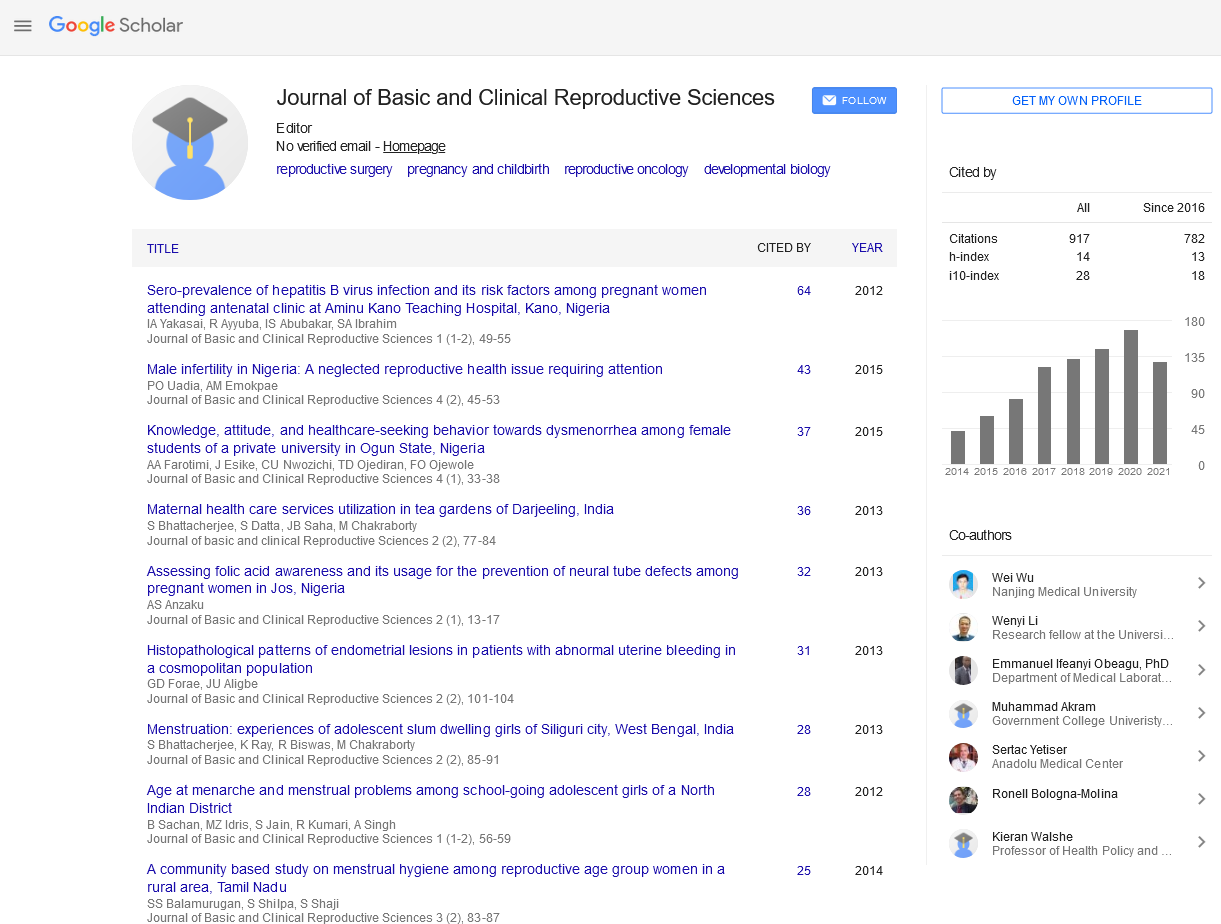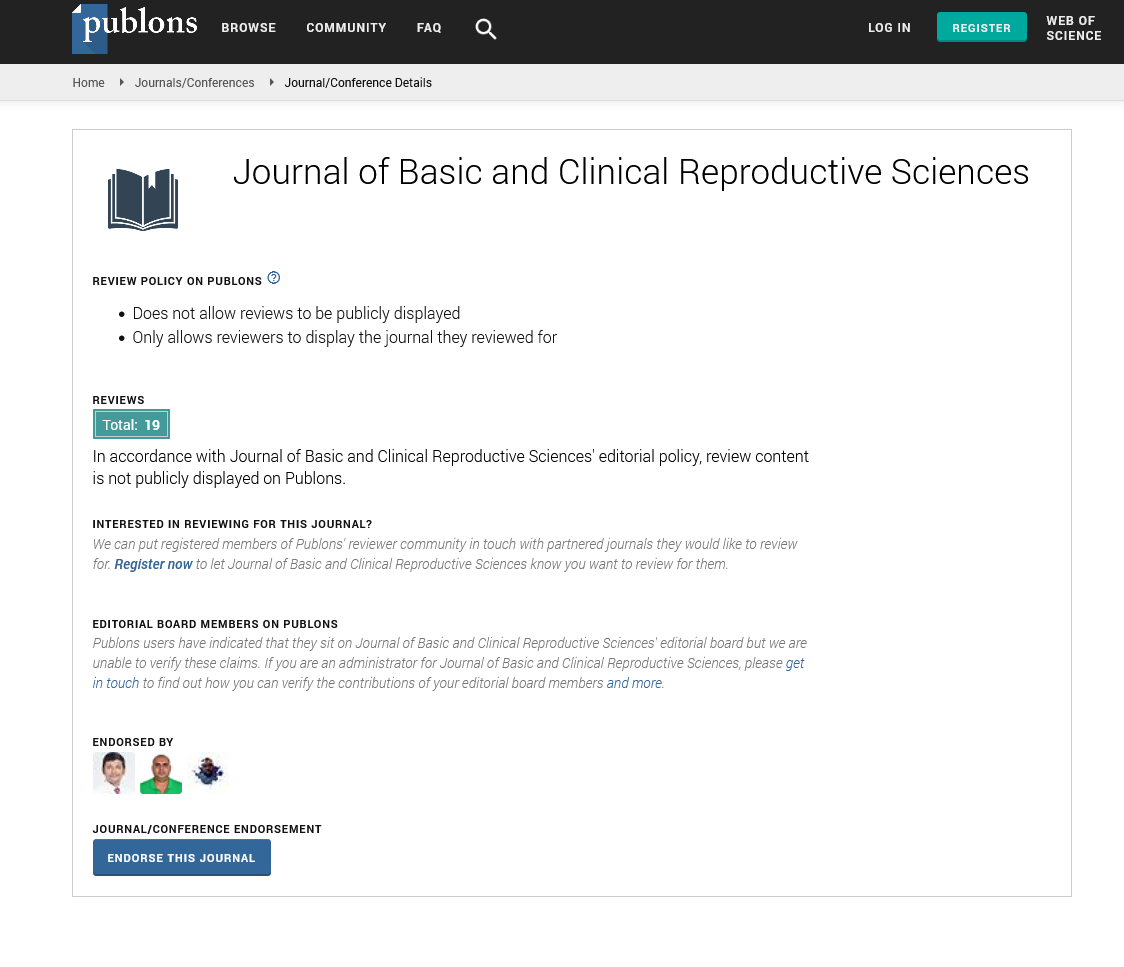Opinion - Journal of Basic and Clinical Reproductive Sciences (2023) Volume 12, Issue 2
Prenatal Diagnosis and Care: Ensuring the Health and Well-being of Mother and Ch
Received: 29-Mar-2023, Manuscript No. JBCRS-23-99228; Editor assigned: 31-Mar-2023, Pre QC No. JBCRS-23-99228 (PQ); Reviewed: 14-Apr-2023 QC No. JBCRS-23-99228; Revised: 21-Apr-2023, Manuscript No. JBCRS-23-99228 (R); Published: 28-Apr-2023
This open-access article is distributed under the terms of the Creative Commons Attribution Non-Commercial License (CC BY-NC) (http://creativecommons.org/licenses/by-nc/4.0/), which permits reuse, distribution and reproduction of the article, provided that the original work is properly cited and the reuse is restricted to noncommercial purposes. For commercial reuse, contact reprints@pulsus.com
Description
Prenatal diagnosis and care play a crucial role in safeguarding the health and well-being of both expectant mothers and their unborn children. Through various screening and diagnostic techniques, healthcare providers can identify potential health risks, genetic disorders, and congenital anomalies early in pregnancy, enabling informed decision-making and appropriate interventions. This manuscript provides an overview of prenatal diagnosis and care, including screening methods, diagnostic tests, and interventions, highlighting the importance of comprehensive prenatal care in promoting optimal outcomes for mothers and their babies. Prenatal diagnosis and care encompass a range of medical interventions and procedures aimed at identifying and managing potential health concerns during pregnancy. With advancements in medical technology and genetic testing, expectant mothers now have access to an array of screening and diagnostic tools that can provide valuable information about the health status of their unborn child. This manuscript aims to explore the various aspects of prenatal diagnosis and care, emphasizing the significance of early detection and intervention in optimizing maternal and fetal well-being. Screening tests are typically the first step in prenatal diagnosis, allowing healthcare providers to assess the risk of certain conditions or abnormalities. These non-invasive procedures include maternal serum screening, nuchal translucency ultrasound, and cell-free fetal DNA testing. By analyzing specific markers and indicators, these screenings can identify potential genetic disorders, chromosomal abnormalities, and neural tube defects. Positive screening results often lead to further diagnostic testing to confirm or rule out specific conditions. When a screening test indicates an increased risk or a need for more accurate information, diagnostic tests are employed to provide a definitive diagnosis. These tests include Chorionic Villus Sampling (CVS), amniocentesis, and fetal blood sampling. CVS and amniocentesis involve sampling fetal cells or genetic material for analysis, while fetal blood sampling provides direct access to the fetal bloodstream. These procedures carry a slightly higher risk of complications but offer greater accuracy in diagnosing genetic disorders and chromosomal abnormalities.
Genetic counseling is an integral part of prenatal care, offering expectant parents the opportunity to understand the implications of screening and diagnostic test results. Genetic counselors provide detailed information about potential genetic conditions, recurrence risks, and available options for management and treatment. Counseling sessions enable parents to make informed decisions regarding further testing, therapeutic interventions, and even pregnancy termination, if desired. Prenatal diagnosis not only aids in identifying potential health concerns but also allows for appropriate interventions and treatment strategies. In cases where a fetal abnormality or health risk is detected, healthcare providers can develop personalized care plans to optimize outcomes. These may include specialized monitoring, medical interventions, surgeries, or referral to multidisciplinary teams for comprehensive management. Prenatal diagnosis can be emotionally challenging for expectant parents, as it may reveal unexpected results or potential health risks. Psychosocial support, including counseling, support groups, and access to mental health services, is essential for promoting the emotional well-being of the parents. Such support systems help individuals cope with the stress, anxiety, and grief that may accompany the prenatal diagnosis process. Prenatal diagnosis and care play a vital role in ensuring the health and well-being of both mothers and their unborn children. Through a combination of screening methods, diagnostic tests, genetic counseling, and appropriate interventions, healthcare providers can identify potential risks, provide accurate diagnoses, and develop personalized care plans. It is crucial for expectant parents to receive comprehensive prenatal care that encompasses not only physical health but also emotional support, empowering them to make informed decisions and promoting optimal outcomes for both mother and child.


